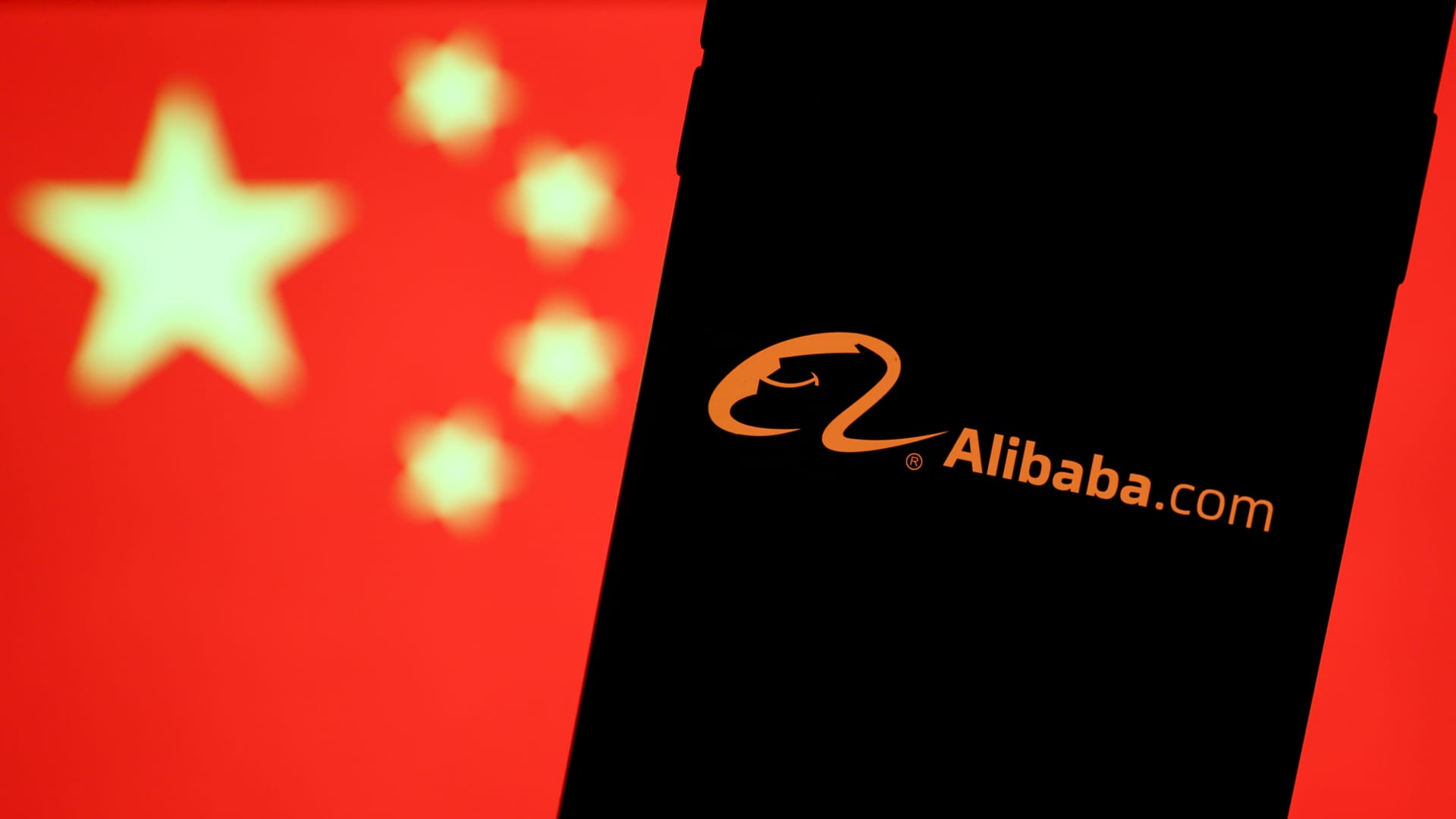
Chinese technology stocks such as Alibaba and Tencent have been hammered in 2022 as regulatory pressure and a slowing Chinese economy weighed on growth. But investors are starting to feel slightly more optimistic toward Chinese tech giants in 2023.
Jakub Porzycki | Nurphoto | Getty Images
It’s been another rough year for China’s tech stocks. Billions have been wiped off the value of the country’s internet giants including Alibaba and Tencent and companies have posted their slowest growth rates on record.
A Covid resurgence in China, which the government countered with its strict “zero-Covid” policy of swift and harsh lockdowns in major cities, has hurt the world’s second-largest economy. Chinese internet firms have seen a slowdown as consumer spending was hit and advertising dollars were cut back.
Investors are treading with caution into next year with regard to Chinese tech stocks and analysts are broadly expecting regulation to be more predictable and growth to accelerate. But uncertainty around China’s economic outlook is creating risks.
Still, signs that China could be thinking about opening its economy again have given investors hope of a turnaround.
“We are positive on 2023 internet sector outlook in light of reopening story and improving consumer sentiment,” analysts at investment bank Jefferies said in a research note last month.
Zero-Covid relaxation in focus
Since the outbreak of the pandemic in 2020, China has adopted the so-called zero-Covid policy which attempts to use strict lockdowns and mass testing to control the virus outbreak. But that policy has weighed on the economy and taken a toll on businesses.
Internet giants Tencent and Alibaba posted their slowest revenue growth rates on record in 2022, while electric vehicle makers like Xpeng saw lackluster sales as consumer sentiment took a hit.
But there are signs that China’s Covid policy may be reversing.

This month, Chinese Vice Premier Sun Chunlan said the Omicron variant of the coronavirus is less severe than previous versions, a shift in tone from the government ahead of announcements on relaxing Covid control measures.
On Dec. 7, Chinese authorities formalized a slew of easing measures which included allowing some people infected with Covid to isolate at home rather than at government facilities, and removing the need for a virus test for those travelling across the country.
In my view, the biggest challenge faced by tech firms next year is probably still COVID and, as a result, the weak and uncertain economic outlook.
Xin Sun
King’s College London
How the exit from zero-Covid is handled could ultimately determine the extent of the rebound for China tech.
“I will argue the prospect of a tech rebound next year depends primarily on the extent to which macroeconomy and especially consumption could recover,” Xin Sun, senior lecturer in Chinese and East Asian business at King’s College London, told CNBC via email.
“Given the current extremely suppressed level of consumption, largely due to COVID restrictions and also the lack of confidence among consumers, a tech rebound is indeed likely if China could smoothly exit from zero-COVID and reopen the economy.”
Tech growth rates set to accelerate
Analysts broadly see growth for Chinese tech names reaccelerating in 2023 as the Chinese economy prepares to reopen — but growth won’t likely be on levels seen in the past, where quarterly revenue jumped 30% to 40%.
Alibaba is forecast to see a 2% year-on-year jump in revenue in the fourth quarter of this year, before accelerating to just over 6% in the March quarter of 2023 and 12% in the June quarter, according to analysts’ consensus estimates from Refinitiv.
Tencent, meanwhile, is expected to post year-on-year revenue growth of just 0.5% in the December quarter followed by 7% in the first quarter of 2023 and 10.5% in the second quarter, according to Refinitiv.
Jefferies said in a note that it considers “online shopping as being in a sweet spot to embrace the recovery story before advertising and entertainment.” That could benefit companies like e-commerce giant Alibaba and rival JD.com.
Analysts at the investment bank said they expect online advertising industry growth to rebound in 2023 but warned that growth will be “highly dependent on macro environment.”
Regulation becomes more predictable
China’s strict Covid policy was a major headwind for its tech sector this year, but investors were already spooked since late 2020 when Beijing ramped up regulatory tightening.
The regulatory crackdown has been a big factor in giants posting slower growth rates and has hammered their stocks.
Since the start of 2021, the Hang Seng tech index in Hong Kong, which includes most of China’s tech giants, has fallen more than 50%.
Over the past two years, Beijing has introduced a range of policies from new antiturst rules to data protection laws and an unprecedented law governing the use of algorithms by tech companies.

Firms that fell foul of antitrust rules were punished with large fines, including Alibaba and food delivery company Meituan, as Beijing moved to reign in the power of its internet giants which had, until recently, grown largely unencumbered.
The gaming sector has been badly hit. In 2021, regulators froze approvals for the release of new video games and brought in rules that capped the amount of time kids under the age of 18 could play online.
The rules spooked investors who were largely caught unaware by China’s regulatory assault on its tech sector.
However, there are signs that some of the regulatory pressure may be easing. Regulators restarted the approval of games this year, which will benefit Tencent and NetEase, China’s two biggest online gaming companies. The government has also on multiple occasions this year pledged to support the technology sector.
“Beijing’s top priority this year is economic growth. The crackdown-style governance is over because Beijing has recognized that it’s a bad idea to spook markets and undermine business confidence,” Linghao Bao, analyst at Trivium China, told CNBC.
“We’ve already seen some recent attempts to relax Covid measures and rescue the property markets. That said, regulations will be here to stay. That means the focus has shifted toward a more measured, predictable approach to regulating big tech.”
Changing business models
From diversification to selling off stakes in other businesses, the impact of regulation and a slowing economy is changing the way Chinese technology giants are running their companies.
Firstly, Chinese tech firms have been cutting costs and exiting non-core businesses in order to boost profitability.
In addition to running China’s most popular messaging service WeChat, Tencent is also a prolific investor in other firms.
But the company has recently started divesting stakes in some of China’s biggest companies. As scrutiny on the tech sector increased, Tencent sold off stakes in some investees including JD.com and Meituan.
Tencent is also focusing on other areas including it fledgling cloud computing business and an international push as gaming sales, one of its biggest drivers of revenue, remains under pressure.
I’m more bullish than I was 6 months ago simply because I think the prices have fallen much further than future earnings estimates have had to be revised downward.
Tariq Dennison
GFM Asset Management
Alibaba, whose China retail business makes up the bulk of its revenue, is trying to ramp up sales from areas such as cloud computing to diversify its business.
Beijing has also looked to separate some financially-linked businesses related to tech firms.
Ant Group, the fintech affiliate of Alibaba, was ordered in 2021 by China’s central bank to become a financial holding company after its initial public offering was pulled in November 2020. Tencent said earlier this year that it is exploring whether regulations will require its WeChat Pay mobile payments service to also fall under a separate financial holding company.
“The crackdowns have fundamentally changed the business logic these firms need to follow … in the past Chinese tech giants strived to build the so-called ‘ecosystem’, which, by aggressively acquiring and integrating different lines of business, increased customer stickiness and engagement,” said Sun from King’s College.
“Now they have to scale back to focus on their main business lines and seek revenue growth from optimised operation and innovation.”
Biggest risks
While some investors have reasons to be optimistic about China’s tech industry next year, they are certainly treading with caution.
Uncertainty about the path of China’s exit from its zero-Covid policy and the trajectory of the economy in 2023. Several investment banks have cut their China economic growth forecasts over the past few months amid a slump in exports and a drag from the real estate sector, two important drivers of growth in the world’s second-largest economy.
“In my view, the biggest challenge faced by tech firms next year is probably still COVID and, as a result, the weak and uncertain economic outlook,” Sun said.
Tariq Dennison, wealth manager at Hong Kong-based GFM Asset Management, told CNBC there are also a number of geopolitical risks including American investors being blocked from buying Chinese tech stocks to companies being nationalized.
However, he clarified that these risks are present but unlikely.
“I don’t think many of those scenarios are that likely,” he said, adding that geopolitical risks are the “biggest collective threat.”
What it means for Chinese tech stocks
A number of analysts and investors told CNBC over the last few months that the plunge in Chinese technology stocks has left some of them looking “cheap” or undervalued.
That’s because stock prices have fallen faster than what analysts believe could be the earnings potential for some of these Chinese technology companies.
“I’m more bullish than I was 6 months ago simply because I think the prices have fallen much further than future earnings estimates have had to be revised downward,” Dennison said.
One metric analysts look at is forward price-to-earnings, a measure of a company’s earnings relative to its stock price, expressed as a ratio. A high P/E could indicate that a stock’s price is relatively high compared to its earnings, and possibly overvalued.
“The average valuation of China internet names … is 14x 2023 P/E vs 22x of global peers as of 30 Nov,” Jefferies said. “We expect the market to look beyond the 2022 turmoil and revisit the sector in 2023.”
Indeed, analysts still see significant upside for Chinese tech stocks.
On average, analysts have a price target of $134.40 on Alibaba’s U.S.-listed shares, indicating roughly 54% upside from the Monday close of $87.16. Analysts have an average price target of 386.91 Hong Kong dollars on Tencent’s stock, or about 20% upside from the Monday close of HK$320.40.
